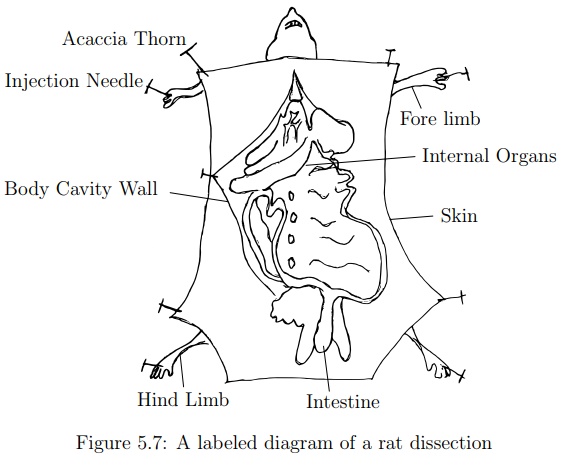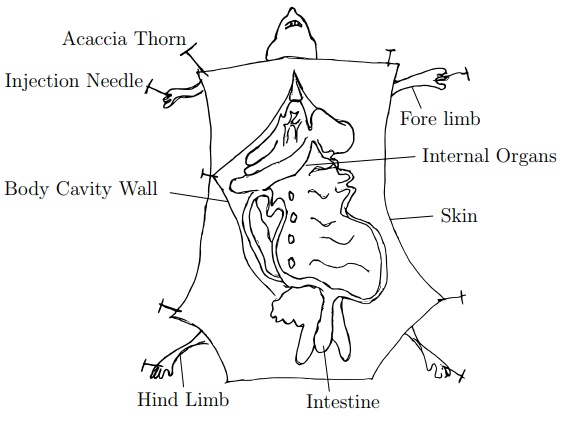Chapter: Biology Practicals: Biology Activities with Specimens
Dissection of a Rat

Dissection of a Rat
A mammal body contains different systems which are vital to its daily life. They perform different important functions. One of the important system is the digestive system. Digestive systems break down large food particles into pieces that are small enough to pass through the gut wall and dissolve into the blood. In order to see the digestive system inside a mammal body and how it works we need to dissect it. Dissections may work well as a demonstration rst by the teacher and then later performed by the students on their own in small groups.
Learning Objectives
To identify parts of the mammalian digestive system and their adaptive features.
Materials
Rat, dissection tray*, knife, needles or o ce pins, clothes pin, razor blade, a bucket full of water, trap, bleach, tomato, charts/diagrams of human diges-tive system.
Specimens
Instructions for collecting and preserving these specimens are described in the earlier sections Rat
Hazards and Safety
Always cut away from yourself to avoid injury.
Preparation Procedure
1. Buy a rat trap from the market.
2. Cut a piece of tomato and put it inside the trap.
3. Put the trap in a place where there are rats overnight.
4. Prepare a dissecting tray.
5. Prepare a dissecting kit with a knife, razor blade, pins( from injection needles from pharmacy and thorns from acacia tree), and forceps from cloth pegs/wood.
6. After catching a rat in the trap, kill it by dipping the trap together with the rat in a bucket full of water for 5-10 minutes.
7. When the rat is dead, add 3 spoons of bleach to the bucket full of water and wait for 10 minutes so that the bleach kills the micro organisms.
Activity Procedure
1. Remove the rat from the bucket.
2. Lay the freshly killed rat on the dissecting board ventral side (abdomen) facing upward and pin it using needles or thorns from acacia plant.
3. Using a clothes pin, lift the skin of the abdomen and using a knife or a razor blade, make a longitudinal cut/slit at the centre of the abdomen.
4. Extend the cut with a knife up to the thoracic cavity and make an incision towards the limbs.
5. Using a piece of wood or clothes pin, separate and stretch the skin from the lower body wall.
6. Pin the folds of skin on the dissection tray using acacia thorns or nee-dles.
7. Cut the body wall on either side of the mid line in order to observe dif-ferent internal organs. Do not cut too deep otherwise you will damage the underlying organs.
8. Open the thoracic cavity by cutting through intercoastal muscles and rib cage.
9. Observe the internal digestive system clearly and use the provided chart/diagram of a human digestive system to compare the structures.
Results and Conclusions
The digestive system of a rat is very similar to that of humans. You will be able to observe the organs of the digestive system as well as other main organs like the lungs and heart.
Clean Up Procedure
1. Discard the dissected rat together with used pin and all unwanted ma-terials into a pit latrine.
2. Clean the dissection tray with disinfectant.

Figure 5.7: A labeled diagram of a rat dissection
Notes
Rats may carry disease causing microorganisms. This is why it is important to place bleach into the water when drowning the rat.
Related Topics